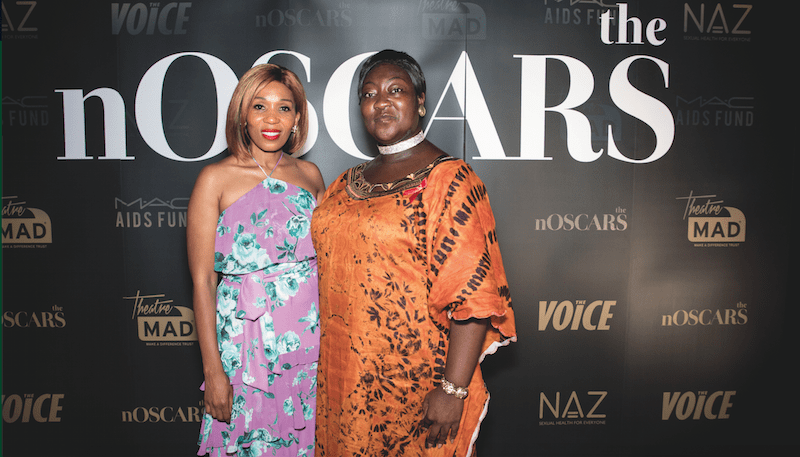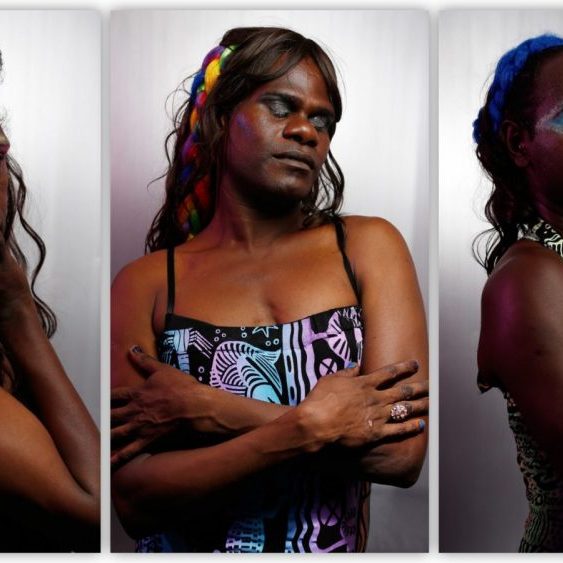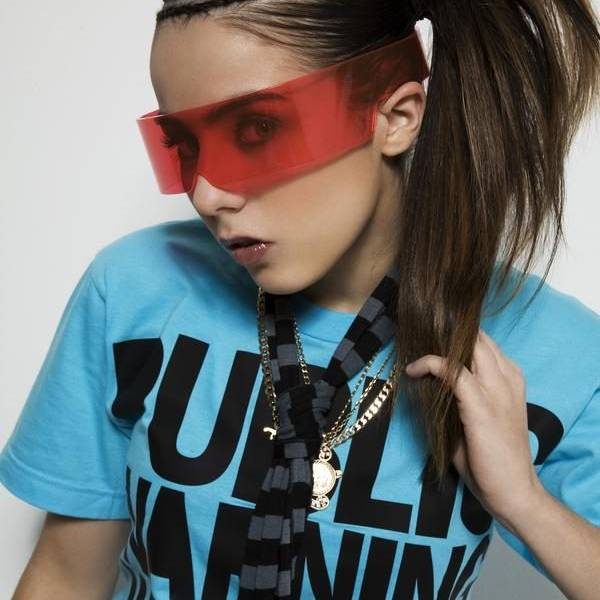
Phyll Opoku-Gyimah meets Nelson Mandela’s granddaughter
On Monday 12 November I attended the NAZ nOSCAR Awards, a wonderful celebration of work by activists, organisations, academics, clinicians and celebrities to bring light, educate and challenge discrimination and stigma around HIV and AIDS.
I continue to be inspired and learn from people like Marian Wadibia, Phil Simba, Marc Thompson and so many others.
The whole event was absolutely awesome, but a massive highlight was that I spent a little time with the granddaughter of Winnie and Nelson Mandela.
An extraordinary power house of a woman, Swati Mandela has certainly inherited her family’s fight for “freedom, equality and justice”.
This is a moment I’ll never forget, so it was only right to let our readers know what Swati Mandela had to say, the love I have for her, and also what I felt from her.
You’re here in the UK in support of NAZ, the charity delivering sexual health services to Black Asian Minority Ethnic (BAME) communities. Why are you so passionate about sexual health?
I first heard about NAZ and their work when Marion [Wadibia, CEO of NAZ] came to South Africa for the screening of their feature film, Faces, which explores the intersecting realities of people of colour living with HIV.
As I explored more about what NAZ does, there was such a strong resonance between my family and NAZ’s mission. My uncle died of AIDS-related illnesses about 13 years ago and so HIV impacted my family in a really big way.
When my grandfather took the decision to announce to the world that our home and our family was being affected by HIV, it was a big shock to many people. NAZ does a lot of work in HIV prevention and awareness and works to combat the stigma. I think if my uncle had known earlier, if he tackled HIV head on, he would still be here. So, I feel connected to NAZ and their work.
You said at the Back2BLAQUE conference that being a Mandela wasn’t always popular…
Well, when Nelson was in jail, it wasn’t popular to be a Mandela. Then he was released and it became a very good thing, being a Mandela. And obviously, all throughout, he and my grandmother were doing incredible, important and necessary work, but they weren’t recognised as doing that.
In many spaces and in many ways, they were seen as disruptors, as agitators for justice, and that isn’t always (or ever) well received by those in power, particularly when the message of liberation that Winnie and Nelson were espousing were so resonant for so many people.
So yes, in school, I didn’t want people to know I was a Mandela. I was very keen to fly under the radar. As I’ve gotten older, though, I’ve really come into my name and my family’s legacy and now I’m finding my feet and my voice and deciding what to lend my voice and my heart to.
And for a while that was fashion.
Yes! I was always very passionate about fashion. It was a mixture of the political statements my grandparents and family weaved into their clothing: what they wore said a lot about who they were or believed in.
On the other hand, I liked that it was so far removed from anything the Mandela’s had done and it was something I could pursue on my own without a great deal of pressure. My grandmother always told me that they fought so that we could do what we wanted to with our own lives, and that whatever we decided to do, we should do it well.
As the co-founder of UK Black Pride, I’ve had my fair share of struggles. From people constantly asking me why we don’t just join the “normal” pride, to a consistent erasure of our voices and experiences, there is always someone ready to diminish and disregard our calls for equality.
I wonder what you’ve learned about moving against the tide, about persistence in the face of adversity?
It’s the Black experience, right? We both know from experience that we have to do what needs to be done because no one is going to do it for us. I feel that, especially as a woman of colour. I think people might pay more attention to me because I’m a Mandela, but I’m still treated as the world tends to treat women and in the various ways the world has learned it’s acceptable to treat women.
I don’t think any woman’s name protects her from that. I do think that as empowered women there is something within us that has been forever changed by other women who have spoken up. I was raised by my grandmother and so I saw firsthand what she went through and she just kept getting back up, how she refused to be deterred and watching that changes a young girl. I began to see my own strength in here.
I mean, I’m descended from her, right? Her blood flows through my veins, so I must be of the same ilk, the same strength. I find a lot in that vision. It’s the same for you, right? There are perhaps people who give you the strength when you don’t think you have much left?
Absolutely. I especially call upon queer Black women from the past, and even a new generation of queer Black women who are rising up and speaking out. And something within me compels me to act, to create change. It’s almost as if it’s beyond my control. I feel like I couldn’t stop even if I wanted to. There is so much work to do. How are you deciding where to get involved?
Well, part of it is carrying on what has already been started by my grandparents.
They did such incredible and impactful work. So from helping edit my grandfather’s prison letters or carrying on his Long Walk To Freedom initiative, which delivers container libraries to rural communities in South Africa, there is a lot for me to me to be getting on with. And I think of my daughter and the world I want her to inherit and the struggles that women face around the world and that gives me further steer.
Many of the issues we face around the world are fixable, but they’re compounded by race, gender and sexuality. The experiences of women of colour around the world give us a pretty good indication of just how much further we still have to go.
As far as deciding the specific issues to lend my voice to, HIV and sexual health feels important, especially because HIV-related illnesses are the number one killer of women aged 15-49 globally. Not only did HIV affect my family directly, but it continues to affect our extended family of women and girls around the world. I think women have played and will continue to play an important role in eradicating HIV.
My mother was always very forthright and upfront about sexual and reproductive health. She took me to my first gyno appointment and introduced me to the doctor who would become my personal gyno, she showed us videos about reproduction and sex, and she just helped put all the correct information in front of us so that we could make informed decisions about our bodies. I don’t think I really appreciated it at the time.
I mean, who wants their mother sitting them down and talking about sex?! But in hindsight, it was a brilliant move on her end and I’m grateful for it.
Yes, I think Black women, and this is almost perverse, but we’ve always been well-placed to affect the most change by virtue of our oppression. Perhaps we’re able to see more clearly than others what does and doesn’t work precisely because we’re so acutely affected by so much. So much our lives seem to orbit around change-making and the collective role as Black women is almost always firmly on the right side of history.
We know that Black women are erased from history, as if we haven’t always been the backbone of global movements for liberation. If we are remembered, our contributions are downplayed and we’re cast in supporting roles to these perfect, selfless men; I think we know that’s not true.
We may be the doting wife who stays up late cooking dinners for men having clandestine meetings, the indefatigable mother who doesn’t put herself first, or any of the other socially acceptable roles we’re so often encouraged to play. But my life has been full of independent women who built lives and movements themselves, who did not ask for permission to live life on their own terms and who decided their place in the world would only be defined by them.
There would be no Nelson Mandela as we’ve come to know him without Winnie, and I think it’s my responsibility to ensure that she is remembered and in doing so help us remember all the women who have been and will be erased.
What do you say to Black queer women like myself around the world who might look to the Mandela name for inspiration?
My hat’s off to you all. Really. Black women and Black queer women have been so instrumental in liberation movements around the world and when my grandmother fought for women, she fought for Black queer women, too, and women who didn’t fit neatly into the tiny little boxes the world creates for us.
I’m not sure there is a liberation movement without Black queer women. So I know my grandparents will be looking upon us all fondly and hoping that we continue to work together for the liberation of us all.
This conversation would not have been possible if it wasn’t for Josh Rivers, Director of Communications at NAZ. Find out more at naz.org.uk


